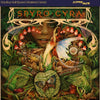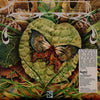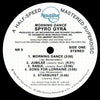







Spyro Gyra – Morning Dance (Half-speed Mastering)
RARITY – Sealed
Spyro Gyra:
- Saxophone, Percussion – Jay Beckenstein
- Electric Piano, Percussion – Jeremy Wall
- Marimba – Dave Samuels
- Bongos, Congas, Percussion – Gerardo Velez
- Bass, Drum – Kim Kurzdorfer
- Drum – Ted Reinhardt
- Electric Piano – Tom Schuman
Additional personnel:
- Vocals – Diva Gray, Gordon Grody, Lani Groves
- Flute – Lew Del Gatto
- Cello – Charles McCracken
- Viola – Alfred Brown
- Violin – Charles Libove, Harry Cykman, Harry Lookofsky, Matthew Raimondi
- French Horn – John Clark
- Bass – Will Lee
- Congas – Rubens Bassini
- Drum – Steve Jordan
- Electric Guitar – John Tropea
- Guitar – Chet Catallo, John Tropea, Rick Strauss
- Keyboards – Jeremy Wall, Tom Schuman
- Percussion – Rubens Bassini
- Steel Drums – Dave Samuels
- Synthesizer – Suzanne Ciani
- Trombone – Tom "Bones" Malone
- Trumpet – Randy Brecker
- Concertmaster – Harry Lookofsky
Written by Jay Beckenstein (A1, A4, B1), Jeremy Wall (A2-3, A5, B3), Jay Beckenstein (A4), Chet Catallo (B2), Rick Strauss (B4)
1 LP, standard sleeve
Original analog Master Tape : YES
Half-speed mastered
Heavy Press : 180g Super Disc
Record Color : Black
Speed : 33 RPM
Size : 12’’
Stereo
Studio
Record Press : unspecified
Label : Nautilus Recordings
Original Label : Infinity Records
Original Label : Infinity Records, MCA, Amherst
Recorded in 1978
Produced by Richard Calandra
Mastered by Darrell Johnson
Originally released in March 1979
Reissued in 1980
Tracks:
Side A:
1. Morning Dance
2. Jubilee
3. Rasul
4. Song For Lorraine
5. Starburst
Side B:
1. Heliopolis
2. It Doesn't Matter
3. Little Linda
4. End Of Romanticism
Reviews:
Morning Dance was the breakout recording for Spyro Gyra, and my favorite release (followed closely by Catching The Sun) of the 1970's. Spyro Gyra (and co-founder/composer Jay Beckenstein), will forever be associated with the title track from this album. This wildly successful follow-up to their debut album (simply titled Spyro Gyra) was eventually certified RIAA Platinum (meaning it sold over 1 million copies).
Half-speed mastering
In half-speed mastering, the whole mastering process is slowed down to half of the original speed. A typical 33 1/3 rpm record is cut at 16 2/3 rpm. The source material is also slowed down (reducing the pitch in the process) meaning the final record will still sound normal when played back. Slowing the whole process down allows more time, which means the end result sounds better and is more efficient — allowing engineering to minimize the effects of inherent limitations within the vinyl format. The result is a more accurate and more open high-frequency response in the half speed vinyl when compared with a normal speed recording.
Ratings :
AllMusic : 3 / 5 ; Discogs : 4.1 / 5 ; The Rolling Stone Album Guide : 2.5 / 5

